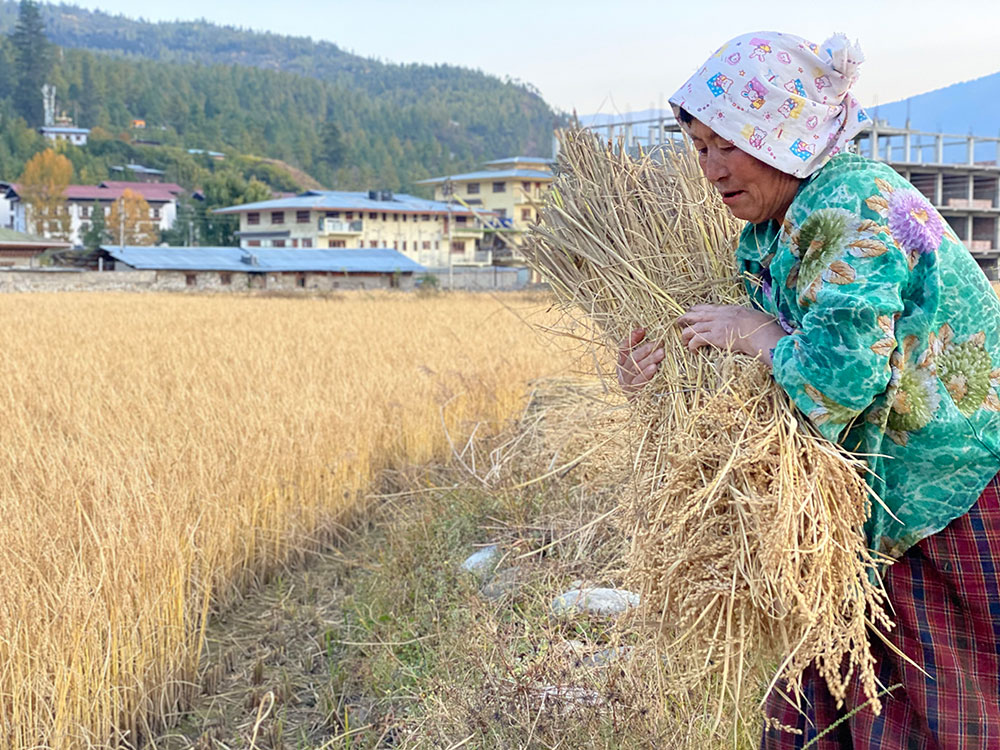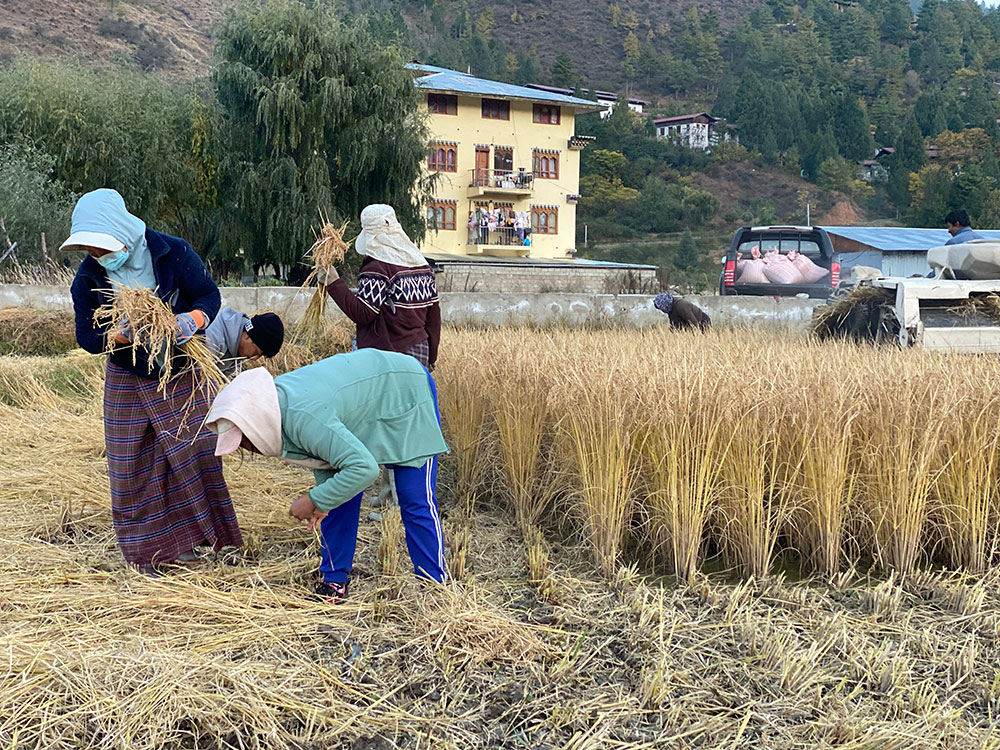Phub Dem | Paro
It is 6:30 pm. Except for the half-moon and lights from the lone combined paddy harvester in the middle of a paddy field in Taju, it is pitch dark.
Bracing the chilly winter breeze, Kinley Gyem from Gonkha under Wangchang gewog, is going on all fours collecting the rice stalks left behind by the roaring machine. Along with her children and the machine operator, the 69-year old farmer is rushing to wind up their day’s work.
Paddy growers in the golden bowl of western Bhutan, and Farm Machinery Corporation (FMCL) operators are racing against time and working from dawn to dusk.
Surprise rainfall at the peak of the harvest season and all farmers competing for the limited number of machines have delayed the paddy harvest in Paro.
Without enough helping hands, Kinley Gyem had to wait for weeks to get the machine. “As all my children are office-goers, it is difficult to do the work manually.”
She recalls the time when the combined harvester first started work at the same field. Farmers then were not really bothered. Gradually, farmers became dependent on the machine as young ones left the villages for work and the labour shortage worsened.
The dependence on the machines has grown so much so that quarrels and minor scuffles over the deployment of farm machinery are annual affairs. There is always a huge rush especially for the combined harvester during the harvest season.

Kinley blames it partly on the farmers. If farmers follow the schedule, there won’t be an issue, and everyone will get their chance gradually. “The problem is everyone is considering one’s convenience and wants to finish their work first.”
Besides, she said that local government leaders should play an active role and monitor the situation.
Paddy harvesting machines, especially combined harvesters, have been a problem during the peak harvest season for some time. A combined harvester can both harvest and thresh paddy at the same time.
While farm mechanisation has significantly increased workers’ productivity, farmers say hiring the machines is harassment every year.
Usually, at this time, paddy growers complete their paddy harvest. According to farmers, continuous rain last month and the limited number of combine harvester machines have affected the timely completion of the work.
Many said that initially, FMCL used to distribute two machines in each gewog. But this time, FMCL came up with a bulk allocation of seven machines each to upper and lower gewog that caused the havoc.
Most of the farmers are disappointed over the allocation of the combined harvester this time.
Pem from Khangkhu said farmers usually finish harvest by October, but the work is still ongoing. “Lomba is near, and we haven’t finished harvesting paddy still. The delay is because of the lack of machines.”
Ugyen from Dop-Shari said that a committee including FMCL and LG leaders decided the distribution of the machine without consulting with the farmers. He added that most working in LG do not know the ground reality during the harvest.
He said that most LG leaders do not know and therefore it was essential to involve the rice grower’s representative from the chiwogs.
He said that there should be sufficient machines or the government should provide subsidies to farmers to buy the machine. “Having more machines will avoid such delays and problems.”

Farmers in Paro are rushing to complete paddy harvest by this week
After the farmers lost their paddy to continuous rainfall last month, the dzongkhag agriculture office and FMCL came up with strategies to address the loopholes.
Dzongkhag agriculture officer Tandin said that they decided to allocate two machines to each gewog after a bulk allocation failed to benefit the farmers. He noted that an additional machine could address the issue.
He added that scarcity of machines, maintenance and replacing the machines was an issue.
There are 18 combined harvester machines in Paro, and FMCL is expecting 20 more next month.
FMCL Chief Executive Officer Karma Thinley said that the distribution mechanism was discussed with eight gups and tshogpas before dispatching the machines. He said that when the issue arose, people blamed the corporation.
He said that the corporation shifted its office to an open space to handle and address the issue right after the rainfall.
He said that the locals had been accusing the employees and demanding the service. “But this year, FMCL did their best in handling the situation.”
With the completion of LG tenure amid the harvest, FMCL and gewog agriculture extension officials work together to continue the service. From next year, he said that FMCL was planning to involve local government officials and more machines.
Meanwhile, Kinley Gyem hopes she could reap her paddy early and unlike this year not to grope in the dark. Farmers in Paro are expected to complete their paddy harvest by this week.


